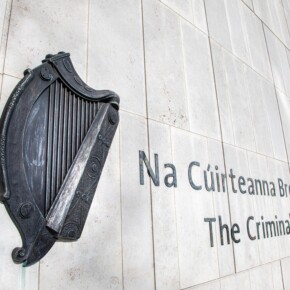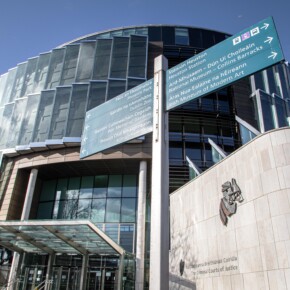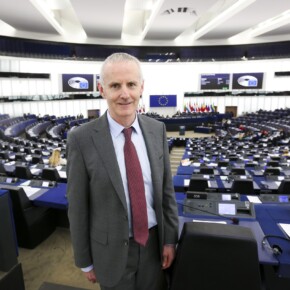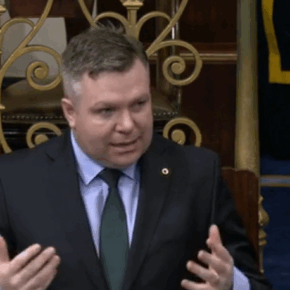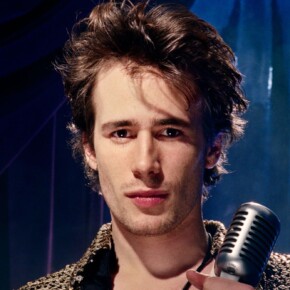Making sense of the Stop Making Sense cult
Mike Finnerty 11 Sep 2024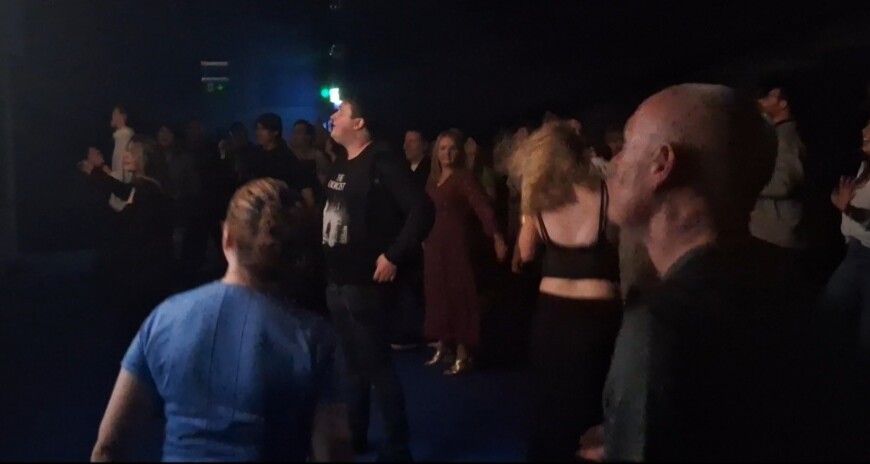
Very few films manage to stand the test of time.
1984 saw the release of Ghostbusters, Beverly Hills Cop and The Karate Kid, all films that represent that incredibly specific vision of the 1980s presented by Stranger Things.
In the public consciousness, cinema of the 1980s is usually remembered for the Steven Spielberg warmth or the Jerry Bruckheimer excess, but Stop Making Sense has managed to outlive its contemporaries thanks to a unique selling point: it turns a cinema into a nightclub.
The film, which depicts the pioneering Talking Heads at the height of their power, is regularly cited as the greatest concert film of all time.
Famous for its gradual process of introducing the band members and stage elements one song at a time, the film has endured in the public consciousness in large part thanks to David Byrne’s iconic giant white suit and regular showings of the film.
The Radio Times write-up of the film ahead of a December 1988 showing on BBC Two reads as the following: “David Byrne’s innovatory visual flair and virtuosity as a performer surmount the cliches of both the tinsel vacuity of pop videos and the tired posturing of rock shows. Jonathan Demme does away with the visual jargon of the rockumentary- no shots to adoring fans – and by dispensing with shaggy perms, straining leather trousers and squealing red guitars, Stop Making Sense drags the pop concert into the 80s.”
The film is marking its 40th birthday this year, and judging by the near sell-out crowd that greeted the film at the end of August, it will endure for another 40 years and possibly another 40 years after that.
A humid Saturday night in August, in many ways, is the best way to see a film like Stop Making Sense.
The sense of anticipation is palpable as David Byrne skitters his way through Psycho Killer, the crowd is sufficiently mellowed out when Tina Weymouth joins him for Heaven, but as soon as Slippery People kicks in on song five the train picks up pace and never stops.
It starts with a few people dancing, and almost en masse, about 100 people filter out of their seats and turn the front of the screen into a dance floor.
All of Talking Heads’ hits are accounted for in Stop Making Sense, with Burning Down The House serving as the starting gun for the controlled chaos.
By the time Life During Wartime is in full flow, Smithfield rivals Berghain, The Haçienda, and Ibiza.
A circle pit, usually reserved for punk shows, forms at the front of the screen as the energy in the room reaches critical mass.
The faithful at the Lighthouse cinema was a mix of people from all walks of life.
Teenagers, college kids, people who saw the film during its first run at the Ambassador in the late 1980s, cinephiles, and a couple visiting from the UK all contributed to a communal experience like no other.
The Lighthouse regularly shows the film, and each time the film is shown an impromptu dance party breaks out in front of the screen.
The dancing faithful represented roughly 2/3rds of the people but sitting down and simply taking it all in is also perfectly acceptable.
Popping out for a drink, we ask a member of staff if screenings are usually this energetic.
“Oh god yeah, it’s like this every time we show it,” they laughed.
2023’s re-release upgraded the film to a pristine 4K resolution, meaning you can now see every stitch on Byrne’s ever-expanding suit.
The film is also shown on a fairly frequent basis at the Irish Film Institute in Temple Bar, but the energy in the Lighthouse during screenings is something that approaches divine ecstasy.
The road to repeated Saturday night bedlam was fraught with challenges, however.
Stop Making Sense was directed by the Oscar-winning director Jonathan Demme, who made the film in the midst of an incredibly difficult production where he had creative control taken away from him.
Prior to the production of the film, Demme’s other film Swing Shift had been wrestled away from him by star Goldie Hawn.
Demme’s previous films, such as 1980’s off-beat Oscar winner Melvin and Howard and 1977’s Citizens Band focused on flawed, but honest people who are trying their best to make their way in the world; humanism is a theme that runs deeply through his films.
Behind the scenes, the director was deeply collaborative and always created a sense of community between cast and crew.
On Swing Shift, that was taken away from him, hobbling the film in the process.
Hawn demanded that Demme strip away the human elements of the World War 2 set comedy drama focusing on workers at a factory and add in 30 minutes of superfluous romance scenes between her and Kurt Russell.
Disenchanted, Demme honoured his existing commitment with New Wave ruffians Talking Heads to film them in concert.
It has been widely reported that the late director was on the verge of quitting directing altogether after his experiences on Swing Shift and it was only for the fact he had agreed to work with Talking Heads that he stayed in the film industry.
The director and the band have an awful lot of overlap; both are interested in the humanity that binds us.
When David Byrne stepped behind the camera himself for 1986’s True Stories (boasting a brilliant early performance from John Goodman) one gets the distinct impression working with Demme rubbed off on him.
Stop Making Sense manifests joy itself and presents it as an act of rebellion; in the year 2324 you could show this film to a distant alien race that doesn’t speak your language and they would get up to dance with you.
Best known for his Oscar-winning hits like Silence Of The Lambs and Philadelphia, Demme passed away in 2017 following a battle with cancer.
Demme left behind a filmography that contains pure joy like Stop Making Sense, the anarchic yuppie nightmare Something Wild, the off-beat wonder of Melvin and Howard and his Bush-era remake of The Manchurian Candidate.
In the wake of Stop Making Sense, U2 actively courted Demme to direct what would later become Rattle and Hum, but stopped short of hiring him for fear of inviting comparisons (although the two films do share a cinematographer in Jordan Cronenweth.)
For the sake of the audience that has allowed the film to live on, they are surely thankful he stuck at directing after threatening to quit.
When the film was re-released last year, the film made more money in the United States than it had in its initial 1984 box office run.
Conducting a straw poll of those present at the screening, there was a mix of hardened fans and people who simply wanted to see what the fuss was about.
Alannah said the film became a big favourite of hers and her friends during the Covid-19 pandemic as it reminded them of better times.
She has seen the film four times this year alone.
“There is a familiarity to it that I really love, and it’s all tied together by Talking Heads’ music. I love how the film just builds and builds.”
With the film a perennial favourite of pretty much anyone with a Letterboxd account, we asked Alannah why the film keeps her coming back.
“I’m actually not that surprised this film has attracted such a cult following because it’s an absolute masterpiece in my eyes. The way the film builds, with the band and crew coming out one by one, it really is spectacular.”
“Absolutely nothing beats seeing it on a big screen, though,” she adds.
Fellow audience member Donal said he remembers the “lore” around screenings of the film at the Ambassador in 1986 and 1987.
Donal specifically cited the way the film centres on the performance of the band and sparsely uses audience reaction shots.
“Demme shoots the film very specifically because he focuses just on the performance. It doesn’t have the typical concert film thing of cutting backstage or the audience bopping around, the camera is trained on the band at all times and it just sucks you in.”
“The film, for me, is timeless. It is the best concert film and it will never be matched.”
He pointed to the fact that people of all ages were at the screening which he says is proof of the film’s intergenerational appeal.
“There are people here with their kids, I think that’s a sign of something.”
“And how many times have you seen the film?”, we enquire.
“15.”
Among the crowd was a first-time viewer named Tom and he had heard “this is meant to be one of the best concert films.”
“I heard about the film through word of mouth, and of course, I’m a big fan of the band. The ticket was only a fiver too so I’d figured I’d check it out.”
For another audience member, coincidentally also named, Tom, it was the combination of director and subject that drew him to the Lighthouse.
“I’ve seen the film four times now, I was a fan of Demme’s films and Talking Heads but I only heard about Stop Making Sense last year.”
We quizzed him as to why he kept coming back.
“I really think it’s all down to David Byrne – he really is compelling, isn’t he?”.


